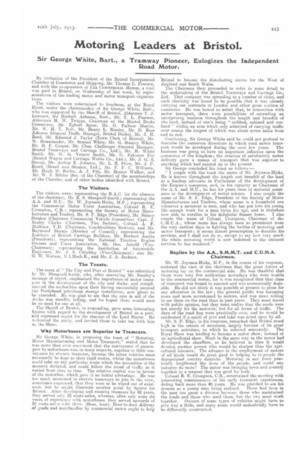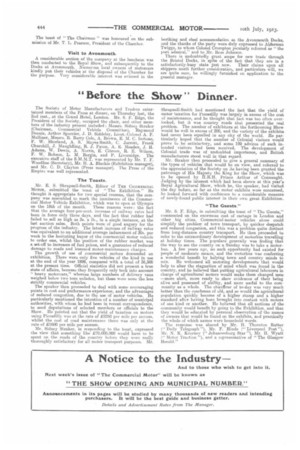Motoring Leaders at Bristol.
Page 3

Page 4

If you've noticed an error in this article please click here to report it so we can fix it.
Sir George White, Bart., a Tramway Pioneer, Eulogizes the Independent Road Motor.
By invitation of the Presidentof the Bristol Incorporated Chamber of Commerce and Shipping, Mr. Thomas L. Pearson, and with the co-operation ef TuE CommEacia.t. MOTOR, a visit was paid to Bristol, on Wednesday of last week, by representatives of the leading motor and motor transport organizations.
The visitors were entertained to luncheon, at the Royal Hotel, under the chairmanship of Sir George White, Bart., who was supported by the Sheriff of Bristol, Alderman T. J. Lennard, Sir Herbert Ashman, Bart., Mr. T. L. Pearson, Alderman H. W. Twiggs,Chairman of the Bristol Docks Committee., Mr. Egbert Spear, Mr. G. Palliser Martin, Mr. W. H. T. Bolt, Mr. Henry L. Riseley, Mr. D. Ross Johnson (General Traffic Manager, Bristol Docks), Mr. J. H. Reed, Mr. Edmund J. Taylor (Town Clerk of Bristol), Mr. W. Hou.selander, Mr. Samuel White, Mr. G. Stanley White, Mr. H. P. Cooper, Mr. Chas. Challenger (General Manager, Bristol Tramways and Carriage Co., Ltd.), Mr. H. White Smith, Mr. W. G. Vernon Smith, Mr. 0. Falconer Fry (Bristol Wagon and Carriage Works Co., Ltd.), Mr. J. G. S. Stroud, Mr. Arthur E. Johnson, Mr. L. R. Price, Mr. J. P. Brazil (Brazil and Straker, Ltd.), Mr. P. F. C. Williams, Mr. Hugh M. Butler, A. J. Pitt, Mr. Horace Walker, and Mr. W. J. Hillier (Sec. of the Chamber) of the onemberships of the Chambe... and of other bodies identified with Bristol.
The Visitors.
The visitors were; representing the R.A.C. (in the absence of the chairman), Mr. E. S. Shrapnell-Smith; representing the A.A. and MU., Mr. W. Joynson-Hicks, M.P.; representing the Commercial Motor Users Association, Colonel R. E. Crompton, C.B. ; representing the Society of Motor Manufacturers and Traders, Mr. S. F. Edge (President), Mr. Sidney Straker (Chairman Commercial Vehicle Committee), Capt. J. Sealey Clarke (Chairman, Tire Section), Colonel A. F. 31ulliner, V.D. (Chairman, Coaehbuilders Section), and Mr. Raymond Dennis (Member of Council); representing the Institute of British Carriage Builders, .Mr. Herbert Austin (President-); representing the National Traction Engine Owners and Users Association, Mr. Geo. Arnold (Vice. Chairman); representing the Institution of Automobile Engineers, Mr. J. S. Critehley (Vice-Chairman); also Mr. G. W. Watson, M.I.Mech.E., and Mr. J. A. Jackson.
The Toasts.
The toast of " The City and Port of Bristol" was submitted -by Mr. Shrapitell-Smith, who, after conveying Mr. Stanley's message of regret, emphasized the importance of motor transport in the development of the city and docks, and complis inented the authorities upon their having successfully secured -the Portishead petroleum storage installation, now aboutto be extended. He was glad to see that the rate in afd of the docks was steadily falling, and he hoped there would soon be no need for one at all.
The Sheriff of Bristol, in responding, gave some interesting figures with regard to the development of Bristol as a port, -and expressed regret for the absence of the Lord Mayor. He welcomed the party, and invited them to take tea with him .at the Show.
Why Motorbuses are Superior to Tramcars.
Sir George White, in proposing the toast of " Motoring, Motor Manufacturing and Motor Transport," stated that, he was more than ever convinced that the conveyance of passengers by moturbu,ses was, in many respects, superior to their conveyance by electric tramcars, because the latter vehicles must necessarily he kept to their rigid routes, whilst the motorbuses .could take up v particular route which the necessities of the moment dictated, and could follow the trend of traffic as it varied from time to time. The relative capital was in favour -of the motorbus, which gave it an initial advantage. He was too much interested in electric tramways to join in the view, sometimes expresEed, that they were to be wiped out of existence, but he might illustrate another point by figures for Bristol. After developing and running tramcars for 42 years, they served only 32 route-miles, whereas, after only some six years of experience with motorbuses, thee served upwards of 50 route-miles with them. (Hear, hear). &xv-to-door delivery e nods and merehaadise by commercial motor ought to help
Bristol to become the distributing centre for the West of England and South Wales.
The Chairman then proceeded to refer in some detail to the undertaking of the Bristol Tramways and Carriage Co., Ltd. That company was spreading to a number of cities and such elasticity was found to be possible that it was al;eady carrying out contracts in London and other great csntres of commerce. He was bound to admit that, in connection with motor transport, there were possibilities of extending an enterprising business throughout the length and breadth of the land, instead of one's being " cribbed., cabined and confined within an area which only admitted of carrying traffic over routes the longest of which.' was about seven miles from end to end.
Continuing, Sir George White said he could not pretend to describe the numerous directions in which road motor transport would be developed during the next few years. The business was going to have an important influence upon the commerce of the kingdom; the creation of satisfactory motor delivery gave a means of transport that was superior to anything which had existed up to the present. Sir George concluded his toast as follows :— " I couple with the toast the name of Mr. Jornson-Hicks. He is known throughout the length and breadth' of the land as a fearless advocate in Parliament of the development of the Empire's resources, and, in his capacity as Chairman of the A.A. and M.U., he has for years been of material assistmice in the development of motor science. I also couple the mime of Mr. S. F. Edge, President of the Society of Motor Manufacturers and Traders, whose name is a household one wherever a motorcar is seen, and who has put into his young life enough work for a. man twice his age, and is therefore now able to ruralize in his delightful Sussex home. I also couple the name of Colonel Crompton, Chairman of the C.M.U.A., whose name has always been so prominent from the very earliest days in fighting the battles of motoring and motor transport; it seems almost presumption to describe his services, and I shall not do so, except to say how very much the whole motoring world is now indebted to the eminent services he has rendered."
Replies by the A.A., S.NI.M.T. and C.U.M.A. Chairmen.
Mr. W. Joynsun-Hicks, M.P., in. the course of his response, endorsed the view of the chairman that the great future of motoring lay on the commercial side. He was thankful that there were very few authorities nowadays who were hostile to the commercial motor, for it. was recognized that that class of transport was bound to succeed and was economically desirable. He did not think it was possible at present to press for any alteration in the law ; the general public was becoming more and more accustomed to motors, and was more willing to see them on the road than in past years. They must travel with public opinion, but. they must realize that the roads were not merely for the motorist, but for all forms of traffic. The days of the road hog were practically over, and he would be eradicated if a spirit of give and take was acted upon by all. Mr. S. F. Edge, in his response, remarked that Bristol stood high in the esteem of motorists, largely because of its great transport activities, to which he referred separately. The Royal Shaw was tending to become a motor show, instead of an agricultural show. Much in the same way as the motor had developed the chauffeur, so he believed in time it would develop another person who would be sharper than the agricultural labourer. The advance in the employment of motors of all kinds would do great good in helping to re-people the depopulated country districts. Motoring in any form practically lengthened the lives of the people, and could any industry do more? The motor was bringing town and country together in a manner that was good for both. Colonel R. E. Crompton, C.B., entertained the meeting with interesting reminiscences of his early transport experiences, dating back more than 40 years. He was gratified to see his dreams as a young man being realized. There had been in the past too great a divorce between those who maintained the roads and those who used them, but the two must work together. Owners of some types of vehicles might have to give way a little, and many roads would undoubtedly have to be differently constructed. The toast of "The Chairman " was honoured on the submission of Mr. T. L. Pearson, President of the Chamber.
Visit to Avonmouth.
A considerable section of the company at the luncheon was then conducted to the Royal Show, and subsequently to the Docks at Avonmouth. Numerous local owners of motorcars kindly put their vehicles at the disposal of the Chamber for the purpose. Very considerable interest was evinced in the berthing and shed accommodation at, the .Avonmouth Docks, and the thanks of the party were duly expressed to Atderman Twiggs, to whom Colonel Crompton jocularly referred as " the port admiral," and to Mr. Ross Johnson. There is undoubtedly great scope for new trade through the Bristol Docks, in spite of the fact that they are in a
satisfactorily-busy state just now. Their claims upon all shippers merit further consideration, and particulars will, we are quite sure, be willingly furnished or. application to the, general manager.
































